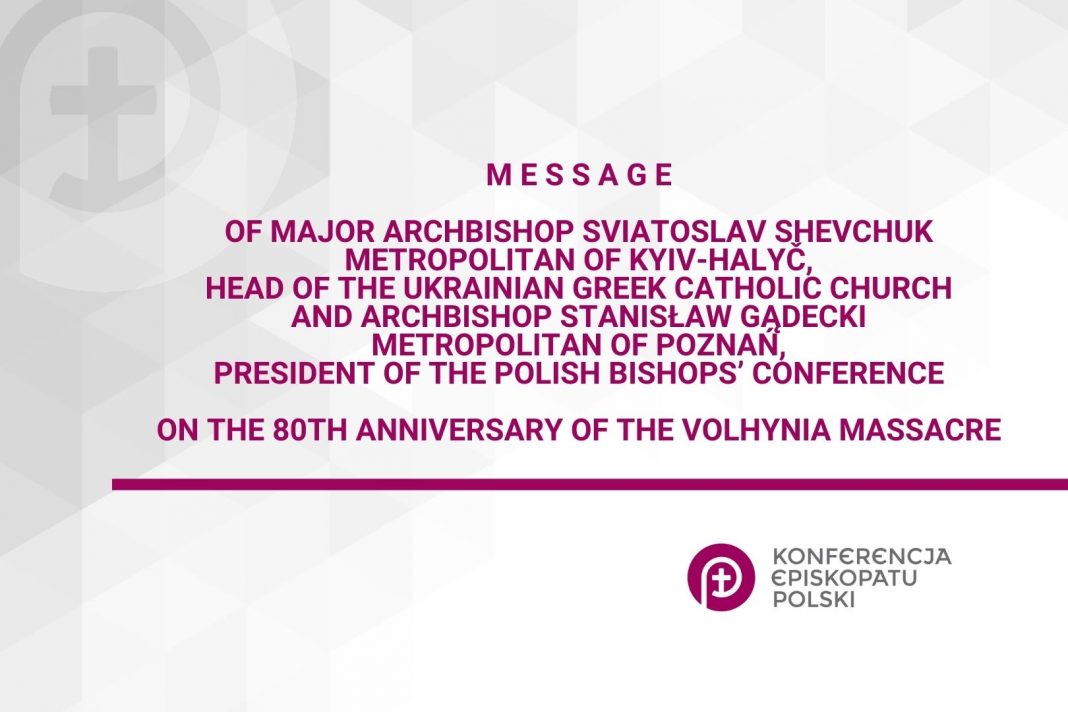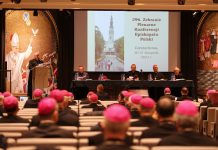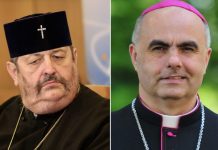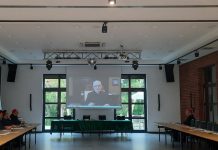We believe that in these difficult days we are writing successive important pages in the book of reconciliation so that we can arrange our shared future as free and equal to each other – we read in the message of Major Archbishop of Kyiv-Halyč Sviatoslav Shevchuk, head of the Ukrainian Greek Catholic Church, and Archbishop Stanisław Gądecki Metropolitan of Poznań, President of the Polish Bishops’ Conference, on the 80th anniversary of the Volhynia Massacre.
The document stresses that reconciliation is not an easy process: “It calls for rising above the ordinary measure of justice, especially on the part of the one who – often justifiably – feels to be wronged more”.
The Message stresses that as of 1987, a number of joint measures with a view towards reconciliation have been taken. “After years of joint reconciliation efforts by the Polish and Ukrainian bishops of both rites, we can say today that this reconciliation has already been achieved on paper. We do not argue among ourselves about the facts of the recent past and their assessment. Over the last tragic months, this has led to specific actions resulting from a sense of affinity, including emotional one, with our brothers in misfortune. Millions of Poles have opened their homes and their hearts to refugees from Ukraine”.
The archbishops admitted in the Message that St. John Paul II will be the patron of the Polish-Ukrainian reconciliation and stressed: “We must remember his personal initiative and patronage over the onset of the process”.
“We believe that in these difficult days we are writing successive important pages in the book of reconciliation so that we can arrange our shared future as free and equal to each other”, wrote the signatories of the Message.
Press Office of the Polish Bishops’ Conference
M E S S A G E
OF MAJOR ARCHBISHOP SVIATOSLAV SHEVCHUK
METROPOLITAN OF KYIV-HALYČ,
HEAD OF THE UKRAINIAN GREEK CATHOLIC CHURCH
AND ARCHBISHOP STANISŁAW GĄDECKI
METROPOLITAN OF POZNAŃ,
PRESIDENT OF THE POLISH BISHOPS’ CONFERENCE
ON THE 80TH ANNIVERSARY OF THE VOLHYNIA MASSACRE
“However much sin increased, grace was always greater” (Rom 5:20).
The history of relations between the Polish and Ukrainian nations is full of beautiful, good and heroic deeds, but, unfortunately, also difficult and dramatic events. Both nations received Baptism at a similar time, although drawing on a different Christian tradition: one on the Byzantine and the other on the Latin rites. This occurred within a single, undivided Church. “Both our peoples lived through the terrible tragedies of the 20th century, suffering immense devastation from such totalitarian regimes as Nazism, Communism and extreme nationalism” (Communique from the meeting of representatives of the Catholic Church in Poland and Ukraine, 9 June 2015). Unfortunately, for our part of Europe, the end of the 20th century did not mark the end of an era of crimes and ethnic cleansing, and attempts were made to deny specific nations their right to exist. The Russian aggression against Ukraine launched in 2014, which has now taken the form of a full-scale war, makes us realise anew that reconciliation between our nations and cooperation between a free Poland and a free Ukraine are the preconditions for peace in our part of Europe. Otherwise, the strings will always be pulled by a “third party”.
Reconciliation is not an easy process. It calls for rising above the ordinary measure of justice, especially on the part of the one who – often justifiably – feels to be wronged more. When the formula “we grant forgiveness and ask for it”, used by the Polish bishops in a letter to the German bishops in 1965, aroused opposition among some Polish Catholics, Polish bishops wrote in a letter to the faithful as follows: “‘There are no innocent people’. We are convinced that if even just one Pole turned out to be an unworthy person, if even just one in the course of history committed an unworthy act, we would already have reason to declare: ‘We are sorry’; if we want to be a nation of noble and generous people, a nation of a better future” (A Message of the Polish bishops concerning letters to bishops’ conferences on the subject of the Millennium, 10 February 1966). We all “feel ourselves gently nudged to recognize the infidelities to the Gospel of not a few Christians of both Polish and Ukrainian origin … It is time to leave behind the sorrowful past!” (St. John Paul II, Homily during the Holy Mass of Beatification, Lviv, 26 June 2001).
As of 1987, we have embarked on many joint initiatives aimed at reconciliation. We have spoken openly about difficult issues, calling inter alia the events of eighty years ago in Volhynia “crimes and ethnic cleansing, inflicted on tens of thousands of innocent people, including women, children and the elderly, mainly Poles, but also Ukrainians and those who rescued their neighbours and loved ones at risk” (Declaration Concerning Reconciliation of the Roman and Greek Catholic Church in Poland and in Ukraine, 28 June 2013). Indeed, the work of reconciliation is not about forgetting, but about overcoming the wrongs of the past so that “through the purification of historical memory, all will be prepared to prioritise what unites rather than what divides” (St. John Paul II, Homily during the Holy Mass of Beatification, Lviv, 26 June 2001). Hence also the joint appeal to historians to help determine the truth about those events, about the extent of the tragedy, but also about the witnesses of sanctity which shines out amidst the darkness, perhaps on the scale of the Ulma family: “We therefore appeal to Polish and Ukrainian scholars to continue source-based research and to work together to elucidate the circumstances of these appalling crimes, as well as to compile a list of the names of all the victims. We also see the need for a dignified commemoration of the victims at the places of their death and greatest suffering” (Declaration Concerning Reconciliation of the Roman and Greek Catholic Church in Poland and in Ukraine, 28 June 2013). Today, after the discovery of mass graves in Bucha, Irpin or Hostomel, we all realise how important it is to explicitly name the perpetrators, exhume the victims, and respect their right to a dignified burial and to human remembrance.
First of all, however, it is important to note that those seeking to overcome the sense of wrongdoing within themselves often confuse forgiveness with reconciliation. In fact, however, these are two different, if interrelated, experiences. Forgiveness precedes reconciliation. It is an inner experience. Forgiveness occurs in the depths of the heart and does not depend on the person of the neighbour. Reconciliation, on the other hand, requires the commitment of all parties involved in the conflict. It can only be established after a mutual exchange of forgiveness. Reconciliation can only be built on truth and justice.
After years of joint reconciliation efforts by the Polish and Ukrainian bishops of both rites, we can say today that this reconciliation has already been achieved on paper. We do not argue among ourselves about the facts of the recent past and their assessment. Over the last tragic months, this has led to specific actions resulting from a sense of affinity, including emotional one, with our brothers in misfortune. Millions of Poles have opened their homes and their hearts to refugees from Ukraine. The Polish government offers tangible assistance to both Ukrainian refugees and the Ukrainian state. We do this because of the Evangelical imperative but also with the awareness that this time it is the Ukrainians who are fighting “for our freedom and yours”. Paradoxically, the result of the Russian attempt to annihilate the Ukrainian people is a mutual rapprochement between our nations. “However, much sin increased, grace was always greater” (Rom 5:20).
St. John Paul II is our patron on the path of Polish-Ukrainian reconciliation. We must remember his personal initiative and patronage over the onset of the process. At the beginning of his pontificate, he indicated: “Ukrainians should feel appreciated. (…) The Church has no right to deprive them of the historical truth about them in the name of ecumenism” (St. John Paul II, Address to the Supreme Council of the Polish Bishops’ Conference, Jasna Góra, 5 June 1979). In the spiritual growth to transcend individual and national egoisms, we need a patron saint to guide us along the paths of conversion.
We believe that in these difficult days we are writing successive important pages in the book of reconciliation so that we can arrange our shared future as free and equal to each other. “The Christians of the two nations must walk together in the name of the one Christ, towards the one Father, guided by the same Holy Spirit, the source and principle of unity. May pardon given and received spread like a healing balm in every heart” (St. John Paul II, Homily during the Holy Mass of Beatification, Lviv, 26 June 2001).
+ Stanisław Gądecki
Metropolitan Archbishop of Poznań
President of the Polish Bishops’ Conference
+ Sviatoslav Shevchuk
Major Archbishop of Kyiv-Halyč
Head of the Ukrainian Greek Catholic Church
Warsaw, 7 July 2023
Translation: M. Turski / Office for Foreign Communication of the Polish Bishops’ Conference

 Polski
Polski







